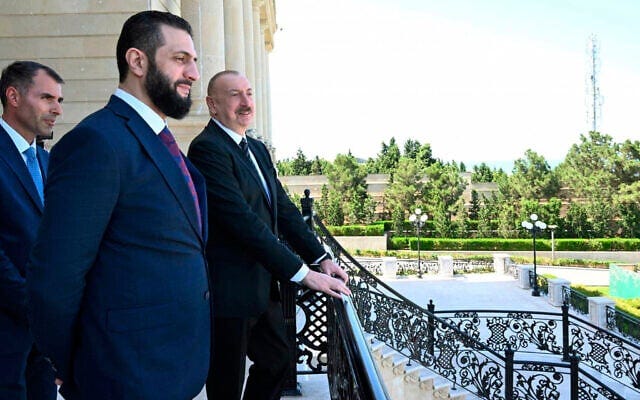Syria-Azerbaijan Sign Energy MoU Under Shadow of Israeli Normalisation
Bilateral relations bolster Turkish influence and lay the groundwork for an expanded Israeli role.
During Syrian President Ahmed al-Sharaa’s working visit to Azerbaijan, Syria signed a memorandum of understanding (MoU) with Azerbaijan’s State Oil Company (SOCAR). Whilst the specifics remain undisclosed, the agreement seems set to supply vital natural gas to the war-ravaged nation, enabling Damascus to diversify its energy sources, which have predominantly originated from the Gulf, notably Qatar and Saudi Arabia. Significantly, the gas is reported to flow through the Türkiye–Syria gas pipeline, echoing a 2009 agreement under President Assad that subsequently faltered due to the ensuing conflict. Syria’s ties with Azerbaijan coincide with indirect contacts with Israel and Israel’s gas deals with the Central Asian country. However, what once appeared to be the imminent normalisation of relations has now been set back by Israel’s recent aggression against Syria, highlighting the futility of economic engagement in the face of continued hostility.
Reviving Assad-Era Deals
Under former President Assad, Syrian-Azerbaijani relations were severely constrained by Syria’s alignment with Armenia, Russia, and Iran, which clashed with Azerbaijan’s geopolitical priorities. A 2009 agreement to supply Syria with 1–1.5 billion cubic metres of natural gas annually via the Türkiye–Syria pipeline held promise but collapsed in 2011 with the onset of the Syrian civil war, which devastated infrastructure and deepened bilateral tensions. Syria’s 2020 recognition of the Armenian genocide further strained ties, leaving cooperation minimal as Azerbaijan focused on its regional priorities, notably the Nagorno-Karabakh conflict. This historical backdrop underscores the significance of the renewed energy partnership, which seeks to rebuild trust and address Syria’s pressing energy needs.
Through Azerbaijan, To Israel
Azerbaijan has emerged as a significant ally for Israel in the Caucasus, serving as a key supplier of advanced military equipment, including state-of-the-art drones and weaponry. This partnership positions Azerbaijan as a crucial strategic partner for Israel, strengthening bilateral ties through extensive defence cooperation.
In early 2025, the State Oil Company of Azerbaijan (SOCAR) signed substantial energy agreements with Israeli counterparts. Facilitated through the Türkiye-Syria pipeline, these deals enhance Turkey’s regional influence while laying the groundwork for Israel’s expanding role in shaping the geopolitical landscape of post-Assad Syria.
In parallel, diplomatic efforts have been notable. In June, Israel’s Foreign Minister expressed interest in normalising relations with Syria, a sentiment supported by the Syrian government’s confirmation of indirect talks with Israeli officials. These discussions, building on prior economic engagements by Syrian business leaders, signal the potential for a historic normalisation between the two nations in the near future.
However, recent Israeli airstrikes on Syrian targets, including the Syrian Defence Ministry, threaten this progress. The attacks risk undermining the fragile progress towards normalisation, potentially complicating diplomatic efforts and regional stability.



